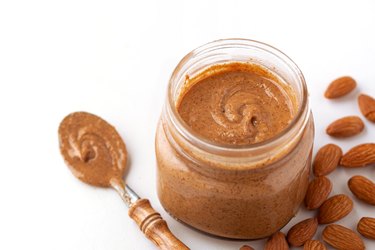
Hankering for PB&J, but worried about triggering GERD symptoms? While many people with GERD report a correlation between acid reflux attacks and certain foods, there aren't any foods proven to directly cause GERD attacks. Peanut butter is a maybe, but almond butter could be an alternative for it.
According to the Cleveland Clinic, 20 percent of the U.S. population has gastroesophageal reflux disease (GERD), a condition in which stomach acid regularly flows back into your esophagus. During a GERD attack, this sour liquid, commonly referred to as acid reflux, can irritate your lining of your esophagus, according to the Mayo Clinic.
Video of the Day
Video of the Day
Is Peanut Butter on a GERD Diet?
Whether you can eat peanut butter depends on whether you're allergic or if it tends to trigger acid reflux symptoms when you eat it, says Lauren O'Connor, MS, RDN, a Los Angeles-based registered dietitian who specializes in acid reflux. If you're in the clear on both of those questions, have at it (though stick to appropriate serving sizes, as too much fat can also be an acid reflux trigger). If it does tend to cause issues for you, almond butter can be a good alternative.
"Almond butter can be used in many of the same ways as peanut butter, so it's a great choice," O'Connor says. "Just keep both to a minimum — 1 tablespoon should suffice. Too much fat in one sitting can cause issues for GERD sufferers."
What Snacks Are Good For Acid Reflux?
You're busy these days, and planning snack options can be exhausting to even think about, even if you desperately want to minimize the occurrence of acid reflux. But by taking the time to do this, you can make one aspect of your day go a lot smoother.
According to O'Connor, various snacks are known to keep acid reflux symptoms at bay. These include:
- Fruits, such as pears, dates, melons and bananas.
- Nuts, such as pistachios and walnuts.
- Vegetables, such as avocado, carrots and edamame (soybeans).
- Low-fat cheese.
What Not to Eat With GERD
Again, these foods haven't been proven to cause GERD but rather may worsen symptoms in a particular individual. If you find that they coincide with GERD attacks, Gulchin Ergun, MD, a gastroenterologist at Houston Methodist Hospital, Houston, Texas, says you'd be best off avoiding:
- Chocolate.
- Citrus fruits (including lemons, limes, oranges and grapefruit).
- Peppers and other spicy foods.
- Peppermint.
- Garlic.
- Onions.
- Tomatoes.
- Vinegar (such as in salad dressings).
- High-fat foods like pizza, certain cheeses or cheese sauces.
- Fried foods like fried chicken or wings.
In addition, according to the Mayo Clinic, some specific drinks you should avoid include:
- Carbonated beverages (like soda and sparkling water).
- Alcohol.
- Coffee.
- Drinks with caffeine.
Foods to Ease Acid Reflux
O'Connor recommends aiming for 2.5 cups of vegetables every day as part of your acid reflux meal plan. It's also important to focus on foods that neutralize stomach acid, she says. One example is almond milk, which can help you enjoy otherwise acidic fruits like raspberries in your smoothies.
"Foods that are not acidic may buffer stomach acid and therefore make you feel better immediately," Dr. Ergun says. "Some people say they feel better if they eat bread or crackers, for example, but their symptoms come back pretty quickly after eating because the stomach empties the eaten food and they're left with remaining stomach acid."
Finally, Dr. Ergun says that you may be able to enjoy eating whatever you wish if you're mindful about what you're eating and how much you're eating, and if you make sure to avoid lying down two to three hours after eating.
By creating a list of foods associated with acid reflux — an acid reflux diet menu of sorts — you can reduce some of the anguish that comes with these unpleasant attacks. You can also figure out if certain snacks, like peanut butter, are safe for you to eat when you have GERD.